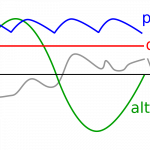Capacitor
A capacitor is an electrical component that stores and releases energy in the form of an electric field. When connected with an inductor, it...
Inductor
An inductor is a passive electrical component that stores energy in the form of a magnetic field when electric current flows through it. It...
Series – Parallel Circuit
Series Circuit:
In a series circuit, components (e.g., bulbs) are connected end-to-end in a single path. If one component fails, the entire circuit breaks, and...
Alternating Current
Alternating current (AC) is a type of electric current where the flow of electrons, or charge carriers, periodically changes direction. Unlike direct current (DC),...
Voltage Divider Rules
This diagram explains the Voltage Divider, a basic DC circuit used to split a single supply voltage into smaller, desired output voltages.
A voltage divider...
Fourier series triangle wave circles
What a triangle wave is
A triangle wave is a periodic waveform that linearly ramps up then linearly ramps down (or vice versa), forming a...
Ohm’s Law
Ohm’s Law
This animation demonstrates Ohm’s Law, the fundamental relationship between voltage (V), current (I), and resistance (R) in a DC circuit.
It shows how changing...
Square Waveform
What is a square wave
A square wave is a periodic waveform that switches between two levels (for example +A and −A, or “on” and...
Impedance Analysis
This diagram explains the impedance behavior of AC circuits, showing how voltage and current signals can differ in magnitude and phase.
Impedance represents the total...
AC Inductive Circuit
As you can see, the current through the coil is 90° out of phase - and delayed. Why? The periodically alternating current flow...
Resistor
A simple circuit with a single resistor connected to a voltage source (battery).
Charges move through the resistor from the positive terminal of the source...
Sinusoidal wave
A Sinusoidal wave in the context of Electrical or Electronics Engineering is used to represent a time-varying voltage or current whose average value in...



